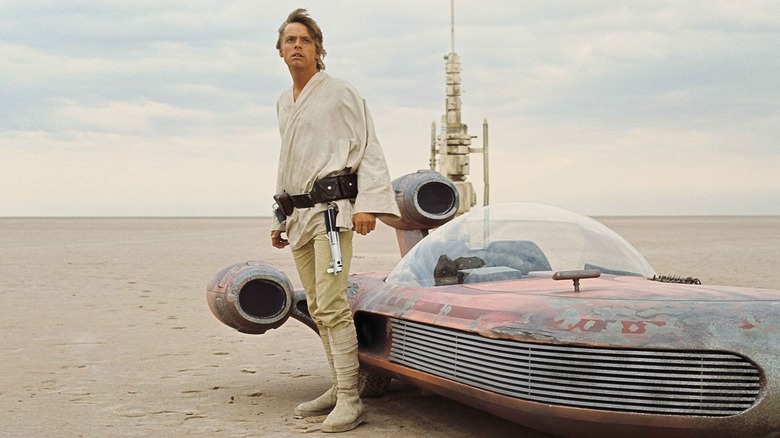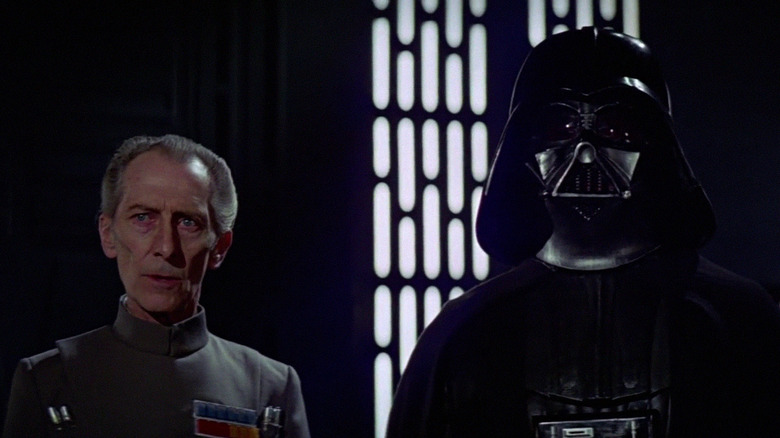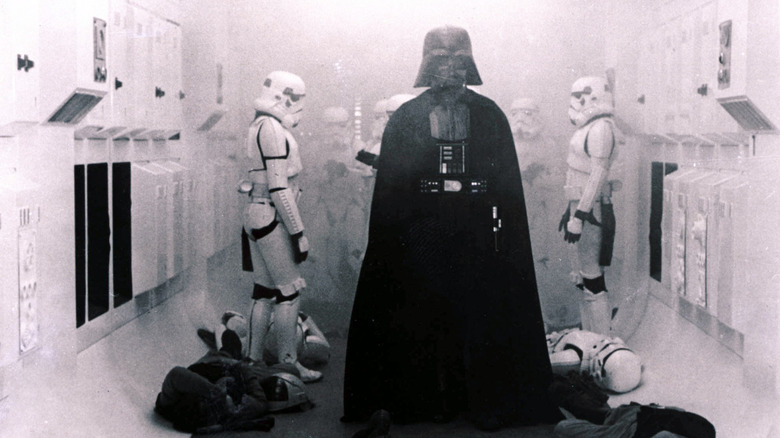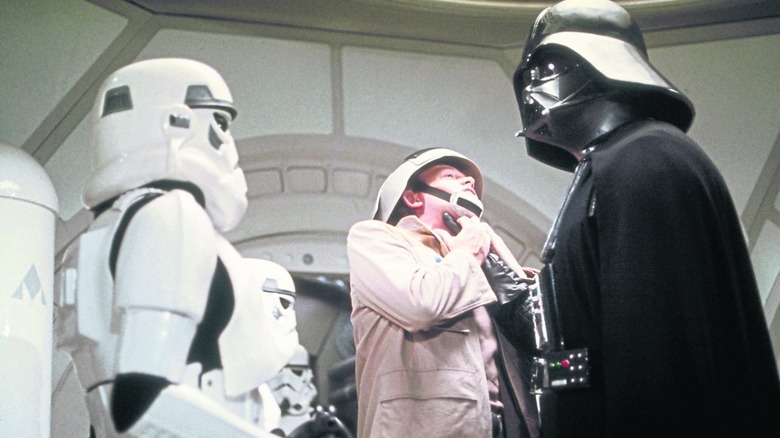George Lucas Didn't Consider Luke Skywalker The Main Character Of His Star Wars Saga
Something curious happened between the release of George Lucas' "Star Wars" in 1977 and Irvin Kershner's "The Empire Strikes Back" in 1980, and I'm not just talking about "The Star Wars Holiday Special."
In the original "Star Wars," the evil Empire was represented by the cold-eyed general Grand Moff Tarkin, played by one of the film's bigger celebrities, Peter Cushing. One of Tarkin's more threatening lieutenants was a masked, black-clad wizard in a cape named Darth Vader (body by David Prowse, voice by James Earl Jones). Darth Vader, while serving the Empire, seemed to operate by his own rules. He wielded a laser sword, something no other Imperial officers did, and he had mysterious psychic powers that give him the ability to choke a man from across the room. Why did he wear that mask? He was very mysterious.
"Star Wars" was an enormous hit, and when it came time to make a sequel, it seemed that Darth Vader's role in the story suddenly expanded. Not only was Darth Vader now in charge of the Imperial ships in "Empire," but he also served as the right-hand man to the Emperor himself (face by Marjorie Eaton, voice by Clive Revill). By the end of that film, Darth Vader would also reveal himself to be the father of Luke Skywalker (Mark Hamill); the protagonist of the theatrical "Star Wars" movies.
But was Luke actually the protagonist? The first three "Star Wars" movies were certainly told largely from his perspective, and Luke's abilities to harness the magic of the Force and defeat the Empire were the crux of their story. But, in 2005, in a Rolling Stone interview, Lucas maintained that all the "Star Wars" movies to date were, in fact, specifically about Darth Vader.
The Importance of Darth Vader
In 2005, George Lucas had just finished making "Star Wars: Episode III – Revenge of the Sith," the tenth film in the series (if one counts the Holiday Special, two Ewok-centric films from the mid-1980s, and an animated "Droids" TV movie). In Episodes I, II, and III, audiences met a young character named Anakin Skywalker (Jake Lloyd as a boy, Hayden Christensen as a young man); the person destined to become Darth Vader. A great deal of time and energy went into zeroing in on Anakin's plight, as well as the specific circumstances that would cause him to become a sci-fi wizard villain in a respiration mask. It was also implied in the prequels that Anakin was born of a virgin birth, and that he was born with a massive capacity for Force-based superpowers. It seems that Darth Vader's importance had now expanded into the role of full-blown anti-Messiah.
With this part of the story filled in, Lucas seems to have retroactively made all the "Star Wars" movies about its central villain, rather than its many heroes. Because Vader was the father of Luke Skywalker, as well as the heroic Princess Leia (Carrie Fisher), Lucas began to see themes of parenthood running through his films. He said:
"I made a series of movies that was about one thing: Darth Vader. Originally, people thought it was all about Luke. The early films are about Luke redeeming his father, so Luke's the focus. But it's also about Princess Leia and her struggle to reestablish the Republic, which is what her mother was doing. So it's really about mothers and daughters and fathers and sons."
Recontextualizing
In the first "Star Wars," Darth Vader destroyed an entire populated planet with a massive death laser, so his "redemption" feels a little weak when he apologizes to his own son for being so wicked. Anakin Skywalker also commits several terrible crimes in Episodes II and III which Luke never learns about, so perhaps "redemption of the father by the son" doesn't quite work out the way George Lucas seems to think it does.
More than anything, Lucas seems to be in the game of deliberate recontextualization. Perhaps to make his earlier, simpler movies seem more complex, Lucas began adding details in later films to make earlier scenes seem more meaningful in retrospect. Some details added issues that were never there before, such as when Leia kisses Luke on the lips just to make Han Solo (Harrison Ford) jealous. It wouldn't be until the following film that audiences would learn the characters were siblings. But the recontextualization excited Lucas in 2005, and considered one "Star Wars" scene in particular:
"Instead of all these surprises that aren't actually surprises, when you get back to Episode IV, as soon as Darth Vader walks through that door, and you see Princess Leia with R2, you're going to say, 'Oh, my God, that's his daughter. Are they gonna find out?' And you get through the whole first movie and nobody figures anything out. The figuring-out part is mostly done off-screen. The first three episodes are a tragedy, and the second three go slightly goofy, but they're inspirational: Even the worst, most evil people find compassion."
Compassion? From Darth Vader? Evidently yes. Lucas said: "Darth Vader has compassion for his children, and that's ultimately what children are for."
Huh?
Was this all planned, or did you make it up as you went along?
Perhaps if Darth Vader had gone through a decades-long period of penance and contrition, with his children spreading peace and harmony throughout the galaxy, maybe Darth Vader would have fulfilled a proper redemption arc. In Richard Marquand's "Return of the Jedi" however, Darth Vader merely kills the Emperor (Ian McDiarmid) at a time when the Empire was on the brink of collapse, the Rebels were poised to win the war, and he was about to die anyway. It was, in short, a deathbed conversion, which is not the most satisfying end to his story.
There is some controversy as to how much of "Star Wars" Lucas had planned out prior to making his original movie in 1977. Some fans have claimed — via the rumor mill — that Lucas had envisioned nine episodes from the very start. Others have said that he, at the very least, mapped out three films. Given the chaotic production of "Star Wars," and access to some early drafts of the "Star Wars" screenplay, it was pretty clear that the filmmakers were slapping together whatever they could under a tight schedule and a mid-level budget. The idea that Lucas intended "Star Wars" to be a massive space epic on the scale that it would become doesn't hold up to scrutiny.
Indeed, a video series for Vice revealed that Lucas didn't plan nine episodes. He only planned one. The twist about Vader being Luke's father didn't enter the picture until the second screenplay draft of "The Empire Strikes Back."
So, are the movies all about Darth Vader? Lucas wants us to think so.



